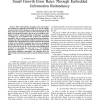Free Online Productivity Tools
i2Speak
i2Symbol
i2OCR
iTex2Img
iWeb2Print
iWeb2Shot
i2Type
iPdf2Split
iPdf2Merge
i2Bopomofo
i2Arabic
i2Style
i2Image
i2PDF
iLatex2Rtf
Sci2ools
138
click to vote
DATE
2009
IEEE
2009
IEEE
Making DNA self-assembly error-proof: Attaining small growth error rates through embedded information redundancy
Abstract--DNA self-assembly is emerging as the most promising technique for nanoscale self-assembly as it uses the simple, yet precise rules of DNA binding to create macroscale assemblies from nanoscale components. However, DNA self-assembly is also highly error-prone and requires the use of error-resilience techniques in order to unlock its potential. In this paper we propose a technique for error-resilience that is based on information redundancy but, in contrast to previous information redundancy schemes, can achieve much higher resilience to growth errors. By expanding the neighborhood from which redundant information is taken, we can extend the distance that errors are propagated and therefore increase the likelihood of the error being reversed. Given a growth error rate of , we show that with a neighborhood of only 2 we can reduce the error rate to 3.64 for arbitrary functions (as compared to 2.33 previously achieved). Compared with spatial redundancy approaches, our technique al...
| Added | 09 Nov 2010 |
| Updated | 09 Nov 2010 |
| Type | Conference |
| Year | 2009 |
| Where | DATE |
| Authors | Saturnino Garcia, Alex Orailoglu |
Comments (0)

